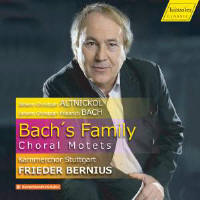Reviewer: Michael
De Sapio
Although
entitled Bach’s Family, this program actually consists of music by one of
Bach’s sons and one of his favorite pupils. Christoph Friedrich Bach
(1732–1795) is notable for being the longest-surviving of Bach’s sons, but
apart from that distinction, he appears to have fallen into obscurity. Our
distinguished magazine lists 50 entries for him, but I’m sorry to say that I
had never heard his music before sampling a concerto for viola and
fortepiano for a review in Fanfare 41:5. We are informed that Wilhelm
Friedmann Bach considered him the strongest player among his brothers.
Looking at his dates, one might expect a transitional composer between the
Baroque and Classical eras, and that is what we get in the two works
featured here.
The motet Ich lieg und schlafe (the text taken from Psalm
4, “In peace I will both lie down and sleep; for you alone, O Lord, make me
dwell in safety”) is dated 1780. It is quite conservative for that date,
more late Baroque or empfindsamer than “Classical” as we think of it; I do
not hear presages of early Romanticism as the annotator does. The music is
lovely, euphonious, and quietly radiant, even if the long opening movement
stretches its material thinly over three lines of text. The alternation of
homophony and polyphony makes for variety. The other of Christoph’s
compositions featured here, a setting of the Wachet auf, opens with
rousing and energetic figures that wouldn’t be out of place in one of
Sebastian Bach’s cantatas. Elsewhere, tortuous vocal passagework winds its
way around the familiar chorale theme. But the music exhibits a certain
harmonic staidness, modulating but little. On the basis of these two works,
the judgment of the 1911 Encyclopedia Britannica seems on the money:
“an industrious composer ... whose work reflects no discredit on the family
name.”
The motets by Johann Christoph Altnickol (1720–1759) featured here
are considerably more florid in style than J. C. F. Bach’s and have more
harmonic variety. They also contain a higher quotient of contrapuntal
writing. Yet even though the composer died as early as 1759 at the age 39,
he was in clearly contact with Empfindsamkeit and the more “advanced”
styles of the day while building upon his traditional apprenticeship with
Bach. The annotator mentions Hasse and Graun as possible influences.
The Stuttgart Chamber Choir does honor to its veteran director
Frieder Bernius, who founded the group 51 years ago. These performances
employ female rather than boy sopranos and include organ continuo on this
occasion. The singing throughout is smooth, articulate, precise, and in
tune. Good luck to you if you don’t know German, because the texts are
presented without English translations; the notes at least are presented in
both languages. A “Bach family” album that avoids the more obvious
characters, including J. S. himself, is a novel idea, and all Bachophiles
will surely find value in this disc.
Fermer la fenêtre/Close window |




